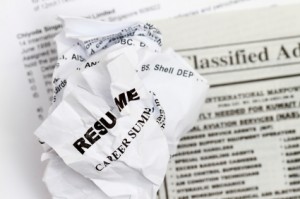I continue to see resumes with “objectives” that are meaningless. Here’s another one from this week:
“To be given the opportunity to work full-time in a facility utilizing my skills and work experience. To grow with a company and establish a career.”
Here’s another:
“To support the growth and profitability of an organization that provides challenge, encourages advancement, and rewards achievement with the opportunity to utilize my experience, skills, and proven abilities.”
Sounds great – would you like to hire this person? But what do you know about this person? Is he/she a candidate for flipping hamburgers or for a CEO  position? Does he have skills in supervising, organizing, planning, selling, marketing, etc? Is she proficient in any computer skills? We don’t know. This “Objective” tells us absolutely nothing about the person. It was a total waste of time on the applicant’s part.
position? Does he have skills in supervising, organizing, planning, selling, marketing, etc? Is she proficient in any computer skills? We don’t know. This “Objective” tells us absolutely nothing about the person. It was a total waste of time on the applicant’s part.
Knowing that most resumes get 30-40 seconds look, you’d better tell the recipient something about yourself that would make them want to see you as a candidate. IMMEDIATELY! Begin your resume with a Skills Summary, Profile, or Expertise. Here’s an example:
Skills Summary:
“Over 14 solid years in technology planning and management. Experienced in strategic systems, organizing and overseeing projects. Knowledgeable in R&D, product development, and financial management. Team player in maintaining company policies and procedures. Expertise with IT businesses, especially those with complex technical, logistical and implementation challenges.”
Don’t waste your time with generic lead-ins that get you sent to the bottom of the pile. Use your 30 seconds to convey your “unique value.”
Companies are not in the habit of helping you out. What they do want is someone who can make a contribution. What is it that you can do to benefit them?
Expanded examples in 6 Job Offers in 10 Days (Chapter Six in 48 Days to the Work You Love)







I agree. Most of what is on a resume is inflated fluff. Get to the point. When I am interviewing a candidate, I love to read their objective out loud. They always smile as if they feel it is a powerful message. Then I say “Why do you think I care about your objective?” Their smile goes away.
I am just challenging them – but in reality I could care less what they want. I want to see how they can solve MY PROBLEMS and not how I can help them meet their objectives. Once I hire someone and they are proven, then we can talk about their objectives.
Totally agree Dan. Too many people going after the same jobs, you have to stand out somehow. I like the examples you post of people putting their resumes in interesting places.
I’ve also read personal purpose statements that sound a lot like your first couple of examples you give. Flowery words that don’t say anything.
Yeah – how about this one we see a lot:
I’m going to love God and serve Him forever.
Yup…I read that a lot too.
If a person personalizes this by saying how they will do so in a way that’s unique to their personality, talents, and passions…then you have a strong purpose statement.
That is key. When we focus on others and serving them with excellence, we can truly begin to operate in the “God-given” gifts. The key is not to sit and wait for a miracle all day, but to DO something. Love it.
I work with a lot of independent contractors and it’s amazing how similar all of their resumes appear. It’s like they all Google “how to write a resume” and copied the same example. B.O.R.I.N.G.
When I was a hiring supervisor I just looked at the objective when I scanned through resumes. You want to pack a punch! This is great advice for those who are just entering the workforce and may not exactly know what they want – at least be as specific as possible! I’m passing this great advice on!
Thanks Sandra. Yeah it’s amazing how non-specific people can be, and then they’re convinced no one is hiring and the economy is bad.
Interesting – the “dud” objectives paragraphs all focus on what the job-seeker wants; the “good” objectives paragraphs focus on what the job-seeker has to offer an employer. People forget that a resume is a marketing brochure, and it needs to sell features and benefits.